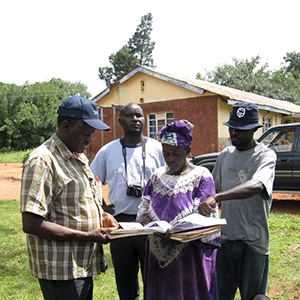As noted by the UN, between 40-85% of all agriculture in developing regions is performed by small-scale farmers (UN 2021). It is therefore critical to consider their views, challenges and successes.
There is tremendous potential for smallholders to benefit from the changes occurring within rural-urban food systems as greater proportions of developing country populations shift to being net purchasers of food, and as rural populations increasingly consolidate into new small towns, and as existing urban populations grow. There are also high risks and many barriers, particularly in the face of changing land markets, declining plot sizes, rising agribusiness/Big Food industry interactions and changing dietary needs and preferences, not to mention changing climatic and environmental conditions, or disruptive pandemic health threats.
In our session we therefore explored and showcased research, interventions and perspectives that suggested how smallholder-inclusive and sustainable food systems can contribute to urban and rural food and nutrition security within the Global South. Here are our main takeaways from the session:
- Equal participation of family farmers
Ms Irish Baguilat, of the Asian Farmers Association for Sustainable Rural Development and member of AgriFoSe2030 steering group opened the session. She highlighted the scale of agriculture that still lies in smallholder hands citing 400 million small-scale and family farms in the Asia-Pacific region alone, and emphasised the high degree of involvement of female farmers. She outlined the work their organisation has been doing to raise the volume of these voices and build solutions from their perspective. Ms. Baguilat ended her talk with a direct call from Asian small farmers to national and international researchers and policymakers for inclusivity, respect and co-creation:
“Conduct your experiments, research, and innovation in a participatory manner, with the equal participation of family farmers through their organisations in the research agenda, design and formulation, implementation, monitoring and evaluation of the research, using in-situ approaches as much as possible. Translate your research outputs to something we can use to adapt and improve our livelihoods. Include representatives of family farmer organisations and /or cooperatives in the governance structures of research programmes.” – Ms Irish Baguilat, Asian Farmers Association for Sustainable Rural Development.
Many of the presenters repeated this message of farmer voice and representation in research and in policy-making in one form or another throughout the day.
- Stakeholder analyses that identify critical actors for smallholder viability
Participants noted that involvement of key stakeholders (such as the Ministry of Livestock and Fisheries; or Ministry of Agriculture) or key anchor farmers, or important value-chain actors, was often a critical success factor. Raising awareness on the important role that small-scale farmers play in a local food system – both for the farmers themselves, but also for key government and value-chain stakeholders – can be a crucial first step towards successful initiatives for smallholder-inclusive food and nutrition security.

Caption: Farmer advisory within AgriFoSe2030
- Extension support and peer-to-peer learning
Examples where interventions had seen successful uptake by smallholder farmers of new food products or new techniques had strong training and extension support in place. In these cases it had been crucial to ensure peer learning and/or the involvement of key institutional or other value chain actors in providing extension and supporting in changed farming practices. . Humphrey Maambo of the University of Zambia, described how their package of interventions implemented together with key value chain actors, helped smallholders overcome barriers to successful chicken farming. This included support with initial inputs and chicks, technique and management training and ongoing extension, as well as support in linking to markets.
Mr Arnold Musungu of the International Centre of Insect Physiology and Ecology, described the success they had witnessed with supporting the farming, processing, marketing and consumption of crickets as an appropriate, ecological, highly nutritious and profitable protein alternative in Kenya. He agreed with the discussion on the value of peer-learning and said that their “village-based advisor (VBA) model where a few trained can be agents of behavior change in promoting alternative food groups and sustainable production systems” had been particularly appreciated.
- Legislative frameworks, intellectual property regimes and plant-breeding activities must be redesigned to benefit smallholders’ needs, knowledge and traditions
A presentation from Mrs Chanda Temba, School of Law, University of Zambia, highlighted how legal barriers that are enshrined in legislative formulations can prevent smallholder farmers from innovating. Too often such legislation also fails to acknowledge the rights to, and value of, traditional seed collection or breeding practices. These legal barriers and formulations have rather tended to formalize and enable neoliberal practices that benefit large corporate plant breeders and actors. Ms Temba advises that Zambia should “utilize TRIPS (TRIPS stands for the Agreement on Trade Related Aspects Intellectual Property Rights [TRIPS Agreement, 1994] of the WTO) flexibilities to formulate tailored policy and legislative reform to introduce a more inclusive Act [the Zambian Plant Breeders Rights Act No. 18 of 2007] supportive of both the informal and formal seed systems in Zambia”.
Dr Klara Fischer, Swedish University of Agricultural Sciences, made a similar call when she described the history of maize breeding in South Africa and raised questions of what was being bred and for whose needs. She noted the importance of “government funded breeding efforts to develop modern varieties that meet smallholders’ needs”.
- Building up resilience capacities
Several presenters talked of the importance of smallholder resilience – the capacity to be resilient in their farming. Ms. Sarah Slinkman and Dr. Jennifer Hodbod, from the Department of Community Sustainability, Michigan State University, described how mega-developments of infrastructure, such as dam construction, can undermine the traditional resilience capabilities of smallholders. They called for better ‘benefit sharing’ from large-scale infrastructure initiatives and noted the need for ‘recognition and protection of commons land’ by development agents.
- Traditions and innovations intertwined
Finally, discussion noted the need to combat a traditional-modern dichotomy by rather working to take the best from local traditions and the appropriate from modern innovations to create hybrid strategies that recognise success in both ecological and social terms, as well as economic. Mr Rohan Mukerjee from the Keystone Foundation and Mr Soumik Banerjee, Independent Consultant, described the traditional success of the kurwa system of shifting cultivation which provided food and nutrition security for the Paharia people of Jharkhand, India, for hundreds of years. This system has increasingly come under pressure from changing climatic conditions as well as market and intensification demands. Under this topic arose the issue of land tenure for smallholder farmers, the importance of not losing traditional knowledge, and the potential for traditional systems to benefit from modern financial mechanisms for carbon credits and moving towards circular economies.
A heartfelt thank you goes to all speakers and participants of the Topic 2 session at the Agri4D conference. Hope to see you soon again!

 Sofia Boqvist, Associate Professor
Sofia Boqvist, Associate Professor
